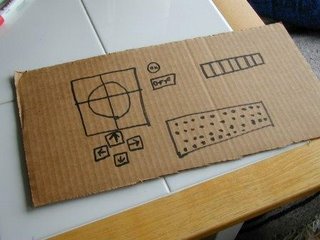Somehow we've got the notion into our heads that playing is somehow trivial - less important than "real work". Fortunately, I've seen enough evidence to the contrary that I rarely feel guilty anymore about playing, even when I'm getting paid to do "real work". I suppose part of it is feeling subversive, but only part. The truth is, as much as I enjoy having fun playing, I enjoy even more discovering how that fun can be turned into something useful. It's rewarding to see the playtime pay off but it can't be about the payoff or it's not real play. That's the paradox of play. To riff off of Julio Olalla a bit, only true purposelessness (when it comes to play anyway) can lead to purpose.
One of the first times I really understood that was back when I first got to try out this new application called a web browser. I was at that time suffering rather serious withdrawals as a result of no longer having access through the academic world into BITNet - one of the early incarnations of the Internet. Fortunately, the whole world wide web thing started getting really popular about then, and suddenly, for the first time, it was both cool AND okay for corporations to get in on the game. And so I started playing around with it. I made sure I got my work done but make no mistake, I was playing - using company access to the Internet and company time, I was fooling around, learning what I could about what was out there and how I could find it and how it all worked. It was fun, pure and simple.
Of course no one else around me seemed to really get what was fun about this. My analogies to a library that constantly responded to whatever ADD-like impulses might strike, following idea upon idea just by clicking something as mysterious as "hypertext links" was, at the time, fairly inept. I kept at it, though and friends and family mostly tolerated my craziness. Then one day, I ran across information about the hypertext markup language itself that made the whole world wide web a more user-friendly place than had been the BitNet-based file storing and sharing of my college days. Just click on a link and you're there. And wonder of wonders, I was delighted to discover that HTML wasn't at all complicated. In fact, for a small fee, there was even a relatively inexpensive editor you could get that made the coding work even easier.
Excited about the prospects and what we might be able to do with such capabilities, I took the idea to my boss. I didn't have a lot to show him at that point except for a lot of hand-waving and more library analogies. While academics had been using it for quite some time by then, the internet was still mostly a place to play at that point for the average corporate hack. But there were a small handful of companies that had started to put up customer-facing websites and a couple of them were even involved in our market - networking - and so I managed to convince my boss that our company ought to think about having a website too. We could publish the kinds of solutions and information we were currently providing our customers via fax and BBS. It would be a great resource as more and more people began to see the power and usefulness of the internet. It would give me an excuse to play some more.
Ultimately, my manager saw enough in my suggestion that was worthwhile to say that he at least wanted to see more. Could I do a mock-up of what I had in mind so that he could see how it might work in reality? He even gave me the money to get the HTML editor. It was called HoTMetaL . That summer, my stepson spent most of his time at his grandmother's so I had relatively few family duties for the entire month of July and a good chunk of August. I put in a lot of 14-hour days learning how to create a website, building the proto-type, and populating it with the kind of information I thought would make it useful. It was some of the most fun I've ever had and I like to believe that I mostly enjoy life as a general way of being most of the time.
At the end of it, I had something worthwhile to show my boss and we took that to various other executives in the company who also began to see the benefits. To be fair, I wasn't the only, or even the first, person in the company to be playing around with this stuff. I was just the first one to figure out how to make a convincing argument for turning what had been playtime for me into something valuable for the company.
By the time we went live with the project three months later, the surprise for me wasn't so much in that I'd been able to make it happen as it was more that we were going live with the proof-of-concept prototype itself. I never once thought it was good enough to be the real deal - my mock-up was just supposed to have been a way of showing people well enough how it all worked to get them interested in making the idea even bigger. Ultimately that happened too and within about a year - give or take a few months - our corporate website looked nothing at all like I'd first built it. I couldn't have been prouder.
This isn't the only time that I've seen play turn into something more worthwhile . And certainly it's not the most important event of my life. I play every chance I get and I make an active effort to remember to take time out to play and explore. And even though I don't always make that quantum leap from purposeless play into purposeful work, it happens a fair amount of the time, mostly because that's who I am. What makes this event stand out is that the linkage between the play and the result is so clear. While I still make an effort to ensure I am productive "enough", I rarely worry about whether I'm playing at the expense of being productive. In my mind, they're related, not mutually exclusive.
I'm curious - what pet projects do you have going that are fun for you and valuable at the same time? I hope you'll consider sharing them with me at techsurvivor@soaringmountain.com - and if you want any tips for getting support for your project(s), be sure to let me know. I've got that part pretty well figured out by now.
How does play fit in with and impact YOUR life?
~~.~~~.~~~~~.~~~~~~~.~~~~~~~~~~~.~~~~~~~~~~~~~
Kimm Viebrock is an ICF-credentialed Associate Certified Coach who helps technology professionals and service-oriented technology groups develop and use their skills more effectively and increase their value within the larger organization, allowing them to do more, do it better and have more fun doing it. Kimm is devoted to finding the connectedness in life.







